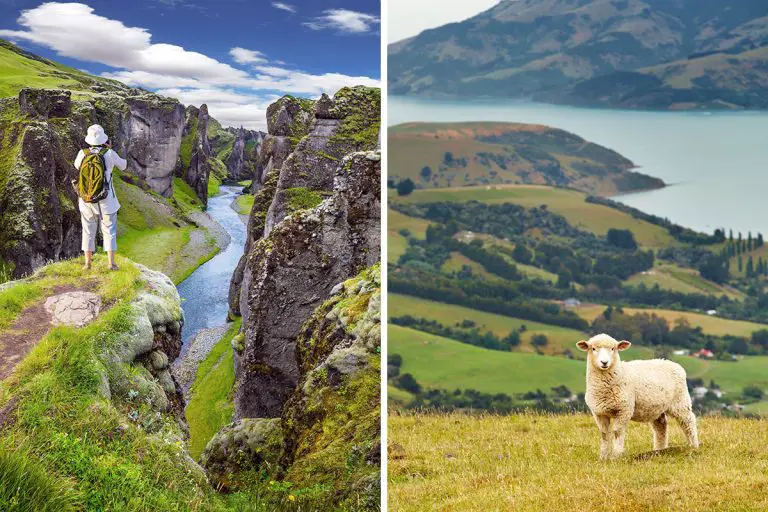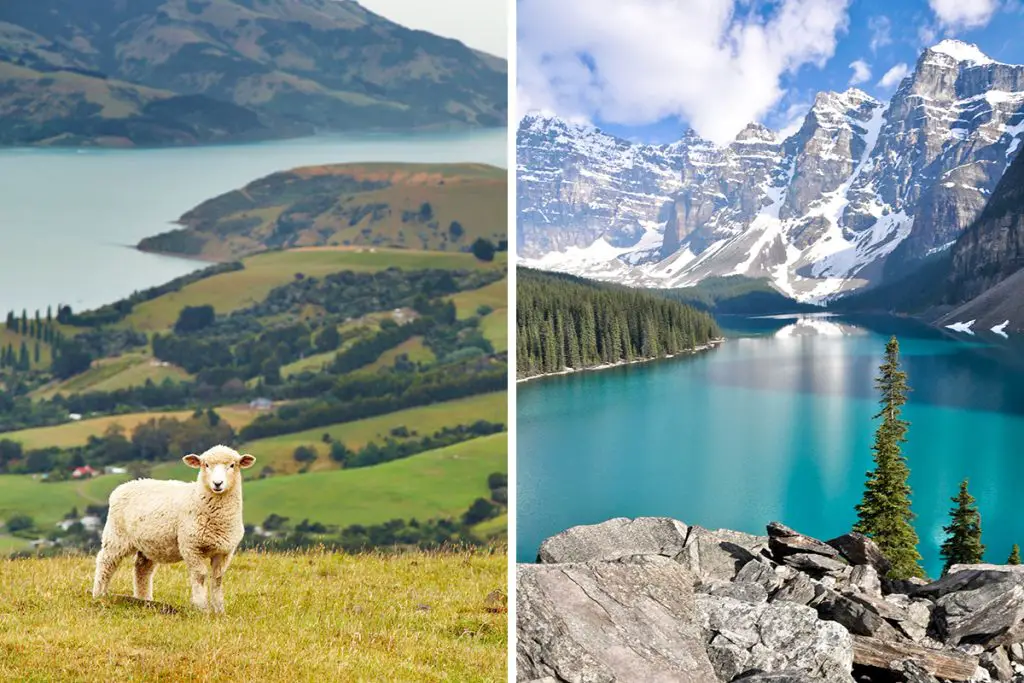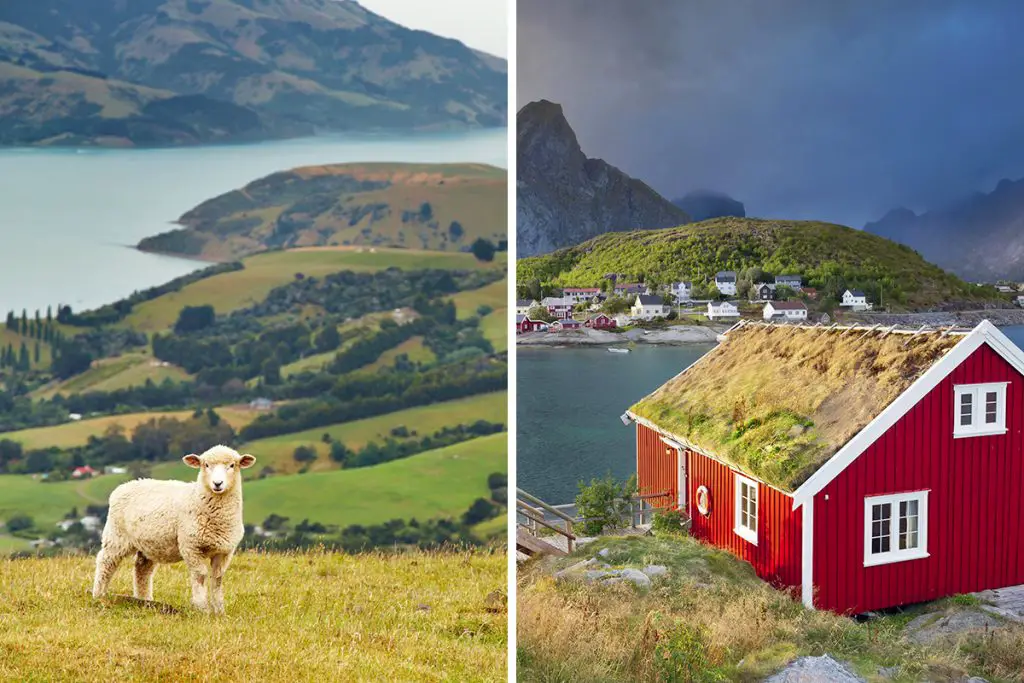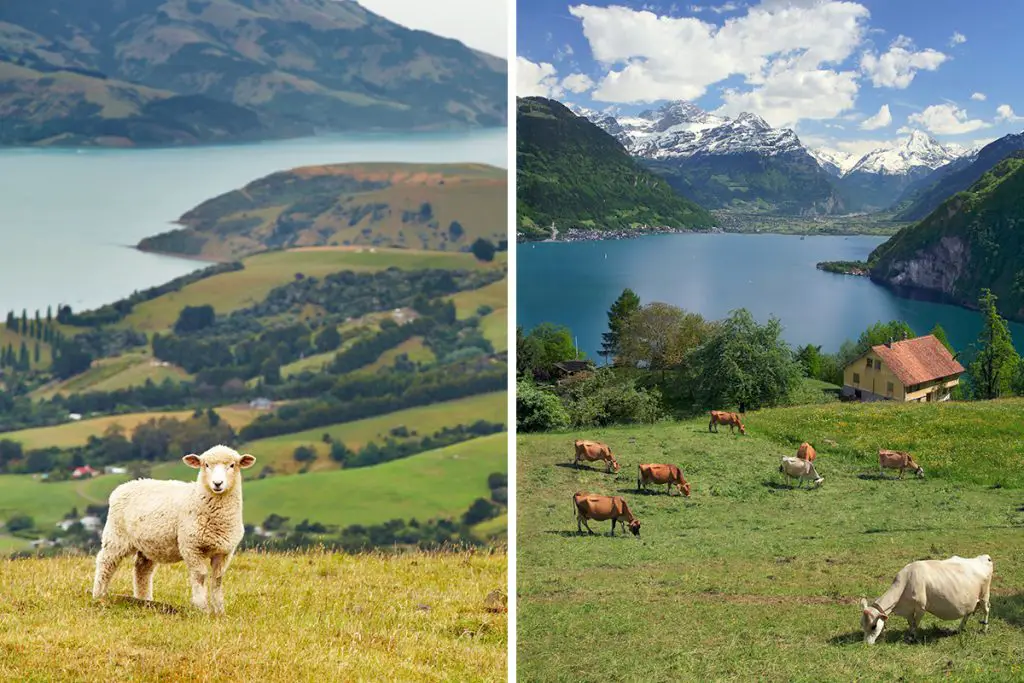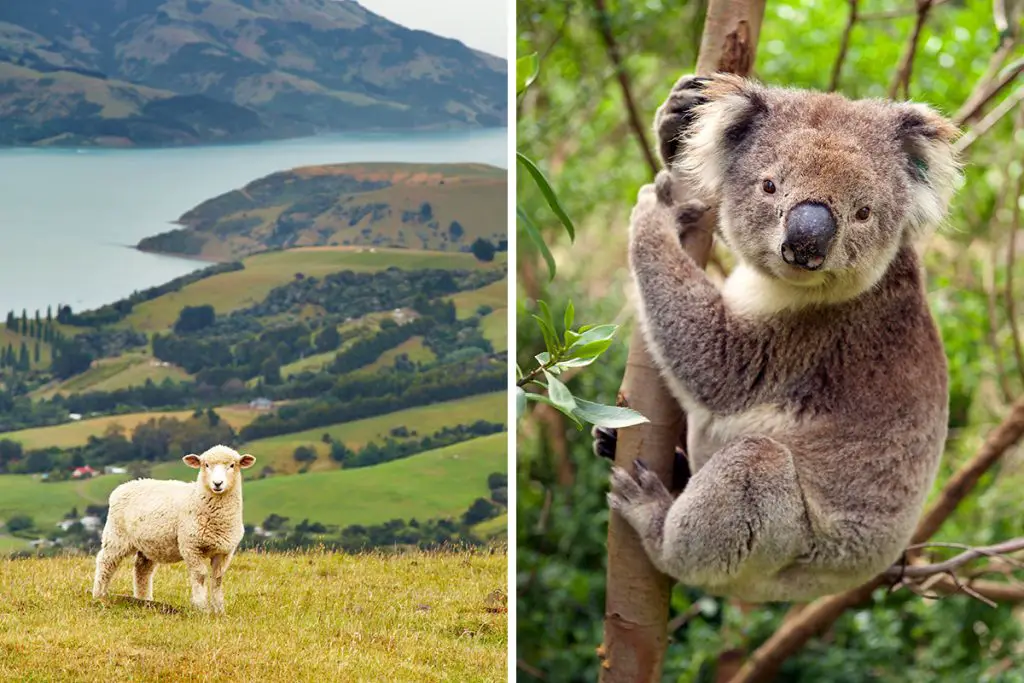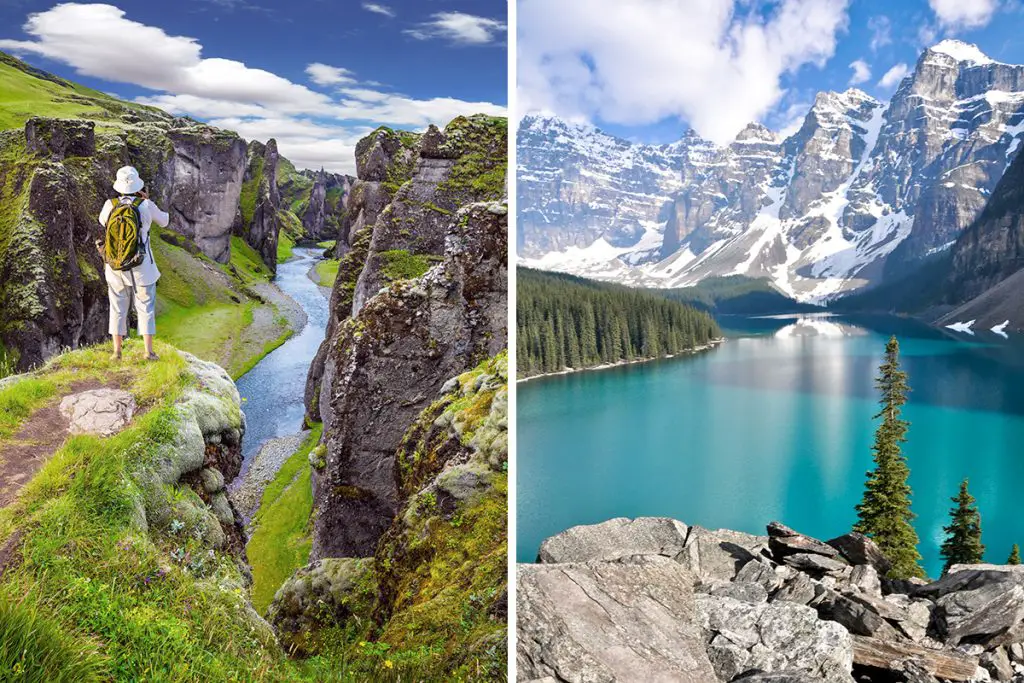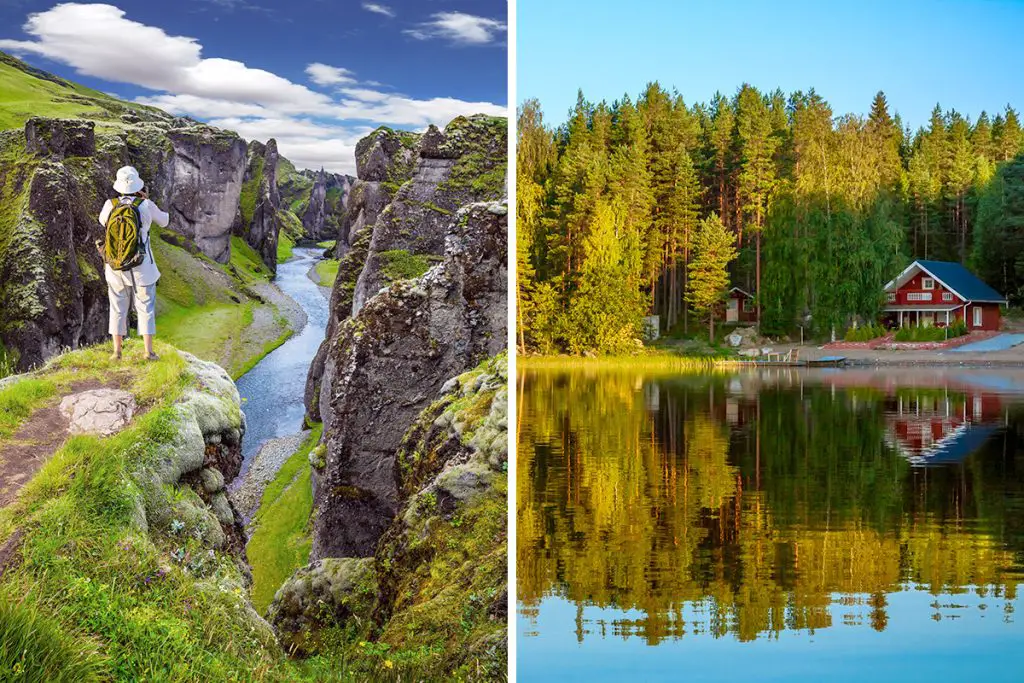As you consider your next grand adventure, you might be torn between the allure of Iceland’s epic tales and New Zealand’s rich folklore. The thrilling narratives woven into each country’s culture are undoubtedly captivating. Read on to delve into these cultural wonders and unearth the stories that resonate with you the most.
History & Culture
When you embark on a journey through time, both Iceland and New Zealand reveal fascinating chapters of human history and culture. Each country offers a distinctive narrative, shaped by its people, landscapes, and the passing of time.
Iceland’s history is closely intertwined with the Viking Age, painting a picture of courage and exploration. The sagas of early Norse settlers are still told today, reflecting the resilience of a society born in a land of ice and fire.
Traditional folklore is deeply rooted in the people, depicting tales of elves and trolls, believed to inhabit the vast landscapes. Even the Icelandic language has remained largely unchanged, preserving a vital link to the past.
Crossing the globe to New Zealand, you’ll find a different story. The Maori people, the original inhabitants, have a strong bond with the land, sea, and sky, which reflects in their culture.
Rich oral traditions and symbolic carvings illustrate a profound respect for nature and a deep sense of community. Maori traditions like the haka, a ceremonial dance, are integral parts of New Zealand’s cultural identity.
But history isn’t just about the past. In Iceland, the enduring strength of its cultural heritage continues to influence contemporary life, from literature to art to daily customs. Similarly, in New Zealand, Maori principles like kaitiakitanga (guardianship) inspire today’s approach to environmental stewardship and social responsibility.
Both countries may differ in their cultural expression and historical journey, but each offers you a rich, colorful tapestry of life and history. Whether it’s the enduring sagas of Iceland or the captivating Maori traditions in New Zealand, your adventure into the past is sure to be as exciting as it is enriching. Where will your curiosity lead you next?
Attractions & Activities
Unfolding the map of your potential adventures, Iceland and New Zealand offer an array of intriguing attractions and activities. Both countries boast impressive landscapes that invite exploration, yet they each present a unique assortment of wonders and experiences to stimulate your sense of adventure.
In Iceland, prepare yourself for an encounter with nature’s mighty forces. You can marvel at the powerful geysers, such as Strokkur, spouting hot water up to 100 feet (30 meters) high. Journey through the Golden Circle, a popular tourist route, encompassing the Gullfoss waterfall, Geysir geothermal area, and Thingvellir National Park.
Don’t miss out on an unforgettable hike across the Vatnajökull glacier, Europe’s largest, where frozen waves of ice meet the sky.
Alternatively, in New Zealand, you’ll find a mix of cinematic landscapes and natural beauty. Hike the Tongariro Alpine Crossing, one of the world’s best day walks, across volcanic terrain in the heart of the North Island.
Venture into the Waitomo Caves to see the magical glowworm grotto or take a leap of faith with a bungee jump off the Kawarau Bridge in Queenstown, the birthplace of commercial bungee jumping.
While Iceland might be famous for its stunning Northern Lights, New Zealand is equally captivating with its Southern Lights or Aurora Australis. Both phenomena light up the night sky, offering awe-inspiring spectacles you will remember for a lifetime.
In summary, Iceland and New Zealand both promise remarkable attractions and thrilling activities. Whether you’re traversing Iceland’s icy landscapes or exploring New Zealand’s varied terrain, your journey will be a series of unforgettable moments and unique experiences.
Eating, Drinking & Nightlife
A place’s cuisine, drink culture, and nightlife are as much a part of its identity as its history and landscapes. In this regard, both Iceland and New Zealand offer a delightful mix that will titillate your taste buds, refresh your spirits, and keep you entertained after dark.
In Iceland, food is about simplicity and preserving the old ways. Traditional dishes like hakarl (fermented shark) and puffin may test your culinary adventurousness. However, for a more universally palatable experience, Iceland’s lamb and seafood are renowned for their freshness and flavor.
New Zealand’s culinary scene is a diverse blend of European, Asian, and Polynesian influences. Their iconic dish, the Hangi, a Maori method of cooking food in a pit oven, is a unique treat. But the true standout is the seafood, with green-lipped mussels and whitebait fritters being local favorites.
When it comes to quenching your thirst, Iceland is famed for its pure water, used to brew excellent beers and distill spirits like Brennivín, a local schnapps. The craft beer scene in Reykjavik is also growing rapidly, with a number of microbreweries offering a great range of brews.
In New Zealand, the story is all about wine. Renowned globally for its Sauvignon Blanc, the country’s wineries offer stunning landscapes and delightful wine-tasting experiences. A trip to Marlborough or Hawke’s Bay is a must for any wine lover.
As for nightlife, Reykjavik in Iceland lights up with live music, dancing, and late-night parties. The city’s compact downtown area is perfect for bar-hopping. New Zealand’s nightlife is more varied, with Auckland’s Viaduct Harbour area known for its trendy bars and dance clubs, while Wellington has a more artsy, bohemian vibe with live performances and underground bars.
Summarizing, both Iceland and New Zealand offer a unique culinary experience, distinctive drinking cultures, and vibrant nightlife. Whether you’re savoring traditional Icelandic dishes, tasting fine New Zealand wines, or exploring the after-dark scenes, each destination offers an authentic taste of its culture.
Shopping
Shopping is more than just a leisure activity; it’s a way to immerse yourself in a destination’s culture. It allows you to discover local artistry, craftsmanship, and products that embody the spirit of the place. Let’s delve into the distinct shopping experiences that Iceland and New Zealand offer.
In Iceland, shopping is about quality and authenticity. You can pick up traditional hand-knitted lopapeysa sweaters, made from the wool of Icelandic sheep, offering warmth and style in the chilly Icelandic climate.
Artisan boutiques in Reykjavik sell unique ceramics, glassware, and jewelry, often inspired by the country’s natural beauty. Don’t forget to check out the local music scene and pick up some albums from popular Icelandic bands and singers.
New Zealand shopping offers a different experience. Kiwi craftsmanship shines in the country’s jewelry, often incorporating native materials like greenstone (pounamu) and bone. If you’re in Wellington or Auckland, pop into one of the local fashion boutiques that showcase New Zealand’s emerging designers. Also, Maori crafts, such as wood carvings or woven items, make meaningful souvenirs that carry the spirit of the land and its people.
To conclude, shopping in Iceland and New Zealand allows you to take a piece of your journey home with you. Whether it’s a handcrafted Icelandic sweater or a piece of Maori artwork from New Zealand, these tangible memories will keep your adventure alive long after the trip ends. Where will you find your perfect memento?
Accommodation
Deciding on your home away from home while traveling is a crucial aspect of your journey. The comfort of your accommodation can significantly enhance your overall travel experience. Let’s delve into the unique lodging options that both Iceland and New Zealand offer.
In Iceland, your choices range from luxury hotels in the capital, Reykjavik, to quaint guesthouses and farm stays in the countryside. A standout feature of many Icelandic accommodations is their location amidst spectacular natural scenery. Some even provide opportunities to watch the Northern Lights from the comfort of your room!
In contrast, New Zealand boasts a wide variety of accommodations to suit all budgets. You’ll find luxury lodges and boutique hotels, particularly in tourist spots like Queenstown and Auckland. For a more unique experience, consider staying in a ‘bach’ (pronounced ‘batch’), a holiday home that is a Kiwi tradition, often located near the beach.
In terms of pricing, both destinations offer options across the spectrum, though Iceland is generally known for being on the pricier side, while New Zealand provides more affordable alternatives.
To sum it up, whether you’re nestling down in a cozy Icelandic guesthouse or soaking up the beachside charm in a Kiwi bach, both Iceland and New Zealand offer a range of accommodations to make your stay comfortable and memorable. Where will you rest your head after a day of adventure?
Family-Friendliness & Children’s Activities
Traveling with family, particularly with children, requires careful planning and consideration. Both Iceland and New Zealand pride themselves on being family-friendly destinations with a plethora of engaging activities for the younger ones.
In Iceland, the outdoors becomes a natural playground. Families can visit animal farms to meet Icelandic horses and sheep, take easy hikes around waterfalls and geysers, or explore lava fields and ice caves. The Whales of Iceland museum in Reykjavik also offers an immersive experience that kids will love.
Over in New Zealand, the range of child-friendly activities is equally impressive. You can visit wildlife parks to see native creatures like kiwis and tuataras. Taking a Hobbiton tour, the movie set from the ‘Lord of the Rings’ and ‘The Hobbit’ films, is a delight for kids and adults alike. Plus, the numerous parks and safe, sandy beaches provide ample room for play and relaxation.
In conclusion, both Iceland and New Zealand offer safe, friendly, and exciting environments for family travel. Whether your kids are budding adventurers, animal lovers, or aspiring wizards, these destinations are sure to provide an unforgettable journey for the entire family.
Getting There & Getting Around
The journey is as important as the destination. Understanding how to get to and around your chosen destination is a crucial part of travel planning. Here, we’ll explore the travel logistics for both Iceland and New Zealand.
Getting to Iceland from the US usually involves a direct flight to Keflavik International Airport, located near Reykjavik. The flight duration ranges between 5 to 8 hours depending on your departure city. For New Zealand, flights from the US typically land at Auckland International Airport and can take anywhere from 12 to 15 hours.
Once you’ve arrived, navigating these countries offers different experiences. In Iceland, driving is the best way to get around. The Ring Road, a well-maintained highway that encircles the country, makes road-tripping an attractive option. This allows for easy access to the country’s natural attractions at your own pace.
In New Zealand, you have the option of domestic flights, buses, and ferries. Renting a car or campervan is also popular for the flexibility it provides, especially for exploring both the North and South Islands.
In summary, while both Iceland and New Zealand might require a long flight, they offer rewarding experiences upon arrival. Whether you’re cruising along Iceland’s Ring Road or hopping between New Zealand’s North and South Islands, your journey in these countries promises to be part of the adventure. So, are you ready to hit the road?
Weather
When you’re preparing for a trip, knowing the weather of your destination is essential. It helps you pack the right clothes and plan your activities. Let’s see how the weather stacks up between Iceland and New Zealand.
Iceland, as you might guess from its name, is known for its cold weather. The summer months, from June to August, are the warmest with average temperatures ranging between 50-60°F (10-15°C). The winters, especially from December to February, are chilly with temperatures often dropping below freezing.
On the other hand, New Zealand’s weather is quite the opposite. Being in the Southern Hemisphere, its seasons are reversed. The summer months, from December to February, see temperatures from 70-90°F (20-30°C), while winter, from June to August, brings cooler weather with temperatures typically between 50-60°F (10-15°C).
What’s interesting is that while Iceland is cooler overall, its coastal locations experience milder winters than might be expected due to the Gulf Stream. In contrast, New Zealand’s maritime climate results in moderate temperatures but also means quick, unpredictable weather changes.
In conclusion, whether you prefer the chilly allure of an Icelandic winter or the warm, inviting summer of a Kiwi Christmas, understanding the weather of both these countries will help you better plan your trip. So, will it be the cold or the heat that shapes your next adventure?
Safety
Feeling safe and secure is important when you’re traveling to a new country. It lets you relax and enjoy your journey with peace of mind. Let’s compare the safety aspects of Iceland and New Zealand.
Both Iceland and New Zealand are considered safe countries to visit. In fact, Iceland consistently ranks as one of the safest countries in the world, with very low crime rates. Similarly, New Zealand also has a reputation for being safe and secure, with friendly locals known for their hospitality.
Unique to Iceland is its volcanic activity. While it creates breathtaking landscapes and natural wonders, it’s important to pay attention to safety warnings around geothermal areas and active volcanoes.
In New Zealand, on the other hand, the main safety concerns are related to outdoor activities. The country’s rugged terrain requires taking precautions when hiking, boating, or participating in extreme sports.
In summary, both Iceland and New Zealand offer a safe travel environment. Whether it’s being mindful of Mother Nature in Iceland or taking care with adventure sports in New Zealand, safety in these countries is more about awareness and preparedness than crime. Ready to explore with confidence?
Cost
The cost of your trip can significantly influence your travel decisions. Knowing what to expect in terms of expenses will help you plan your budget effectively. So, how do Iceland and New Zealand compare in this regard?
Iceland is generally known as a more expensive destination. The cost of living is high, and that translates into higher costs for food, accommodation, and transportation. For example, a meal in a mid-range restaurant might set you back around 3,000 Icelandic Krona ($24).
In comparison, New Zealand is generally more affordable. While still not cheap by global standards, you can expect lower prices for your day-to-day travel expenses. That same mid-range restaurant meal in New Zealand might cost around 20 New Zealand Dollars ($14).
Of course, costs can vary greatly depending on your personal travel style and preferences. But generally speaking, your dollar is likely to go a bit further in New Zealand than in Iceland.
In conclusion, while Iceland’s breathtaking landscapes and natural wonders are truly priceless, New Zealand offers a more budget-friendly alternative without compromising on beauty or adventure. So, where will your budget take you next?
Which Is Better – Iceland or New Zealand?
Selecting the perfect destination for your next vacation can be a challenging task, especially when the contenders are as uniquely intriguing as Iceland and New Zealand. After delving into their history, culture, attractions, beaches, gastronomy, shopping, accommodation, family-friendliness, transport, weather, safety, and costs, it’s clear that both destinations shine in their own ways.
Looking back at history and culture, Iceland’s Viking roots and sagas might appeal to history buffs, while New Zealand’s Maori heritage and Haka performances would fascinate those interested in indigenous cultures.
For activities and attractions, Iceland’s unique volcanic landscapes and geothermal springs offer a different kind of experience compared to New Zealand’s magnificent fjords and Hobbiton movie set.
In terms of natural beauty, Iceland’s black sand beaches present a stark contrast to the golden sands of New Zealand. For food lovers, both countries offer distinct culinary experiences, from fresh seafood in Iceland to New Zealand’s renowned lamb dishes.
Shopping in each country offers a chance to bring home unique souvenirs, be it woolen goods from Iceland or traditional Maori crafts from New Zealand.
Accommodations in both countries vary from budget to luxury, but the opportunity to stay in unique lodgings like an Icelandic yurt or a New Zealand farmstay could tip the scales. Family-friendliness is evident in both countries, with safe environments and plenty of children’s activities, but New Zealand might edge out with its variety of adventure sports for older kids.
When it comes to getting there and around, both destinations require some effort, but the journey becomes part of the adventure whether you’re driving on Iceland’s Ring Road or hopping between New Zealand’s islands. Weather-wise, you’d choose Iceland for its cool, ethereal beauty or New Zealand for its milder, more varied climate.
Considering safety, both countries rank high, but do remember to heed local advisories on natural elements, be it volcanoes in Iceland or rugged terrains in New Zealand. Lastly, cost can be a decisive factor, with Iceland being generally pricier and New Zealand offering a slightly more budget-friendly option.
So, is Iceland or New Zealand better? The answer depends on your preferences and what you’re seeking from your holiday. If a mystic, colder climate with an otherworldly landscape and a unique culture sounds appealing, choose Iceland. If a more moderate climate, vibrant indigenous culture, a wide range of outdoor activities, and stunning landscapes call to you, then New Zealand is your destination. The choice is yours!

